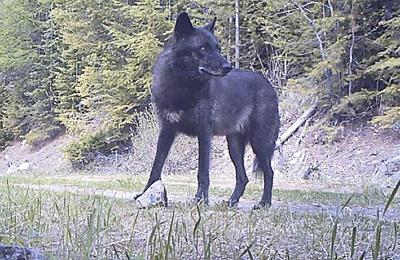Washington Fish and Wildlife may prohibit cattle from some department grazing lands to avoid conflicts with wolves, according to an internal review of grazing policies.
The review responds to a wolf population growing in numbers and territory. If the department follows through, some of the 129,459 acres of grazing land owned by Fish and Wildlife likely would be off-limits to cattle.
In other places, ranchers would have to sign detailed plans to prevent attacks by wolves with non-lethal measures. In some cases, cattle could be taken off the land to stop the depredations.
“It’s inevitable wolves will depredate livestock on our lands,” Fish and Wildlife Lands Division Manager Cynthia Wilkerson said Feb. 13. “We’re going to try to reduce the conflicts. You may have to move either the wolves or the livestock. To be fair, we have to look at both sides of the equation.”
Washington’s wolves have primarily attacked livestock on federal and private land in northeast Washington. Wolves, however, are spreading. A ranch hand in Adams County this month shot one of three wolves chasing cattle in an area without any known wolfpack.
Fish and Wildlife’s grazing land provides forage for 15,975 cow-calf pairs. The department’s 53 grazing leases include 30 in north-central Washington and six in Eastern Washington, regions with documented wolfpacks. The department says it’s too soon to estimate how many leases or acres would be affected by new wolf-driven grazing policies.
Fish and Wildlife brought up its internal review in a conference call Feb. 13 with the department’s Wolf Advisory Group. Okanogan County Commissioner Andy Hover said he did not want ranchers to lose grazing land.
His north-central county is on the frontier of the westward migration of wolves.
“If you say, ‘Well, we’re in wolf country, and we have to take grazing off land, I’ll take huge issue with it,” he said. “If you’re not allowing agriculture to continue on these properties, all you’re doing is shrinking your agricultural base.”
The department owns land — and plans to acquire more — that has been historically used for grazing.
County commissioners could use their influence to block Fish and Wildlife from acquiring more land, Hover said.
“I will fight tooth and nail to keep grazing going on Fish and Wildlife land that historically has grazing on it,” Hover said in an interview after the call.
The department says phasing in a new policy could take up to five years as grazing leases expire and come up for renewal.
Removing cattle may be a “simple fix” and make economic sense in some places, especially considering Fish and Wildlife’s primary mission to protect wildlife, said Tim Coleman, director of the Kettle Range Conservation Group. “I don’t know of anyone who goes to public lands to observe cows,” he said.
In the Colville National Forest, heavily populated by wolves, ranchers have delayed turning out cattle and moved herds to different pastures to prevent conflicts, but the Forest Service has not curtailed grazing, forest spokesman Franklin Pemberton said.
“Our permittees have done a lot to change things,” he said. “We try to use as much adaptive management as we can.”
Fish and Wildlife has killed wolves to stop attacks on livestock on federal and private lands, providing ranchers have satisfied the department they’ve tried to prevent depredations. The internal review doesn’t rule out killing wolves on Fish and Wildlife land as a last resort, but the department will hold itself to a “higher bar for wolf conservation.”
“WDFW thinks there may be locations or times where grazing is inappropriate,” according to review.
“We’re going to have a different bar in some cases than Forest Service operations or private lands,” Wilkerson said.
Source: Wolves may keep cows off Washington Fish and Wildlife land | Livestock | capitalpress.com
